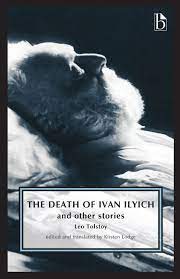The Death of Ivan Ilyich – Leo Tolstoy
Posted by Vish Mangalapalli on March 26, 2024



The core themes in Tolstoy’s novella ‘The Death of Ivan Ilyich‘ cover the immutable and attendant realities of aging viz. sickness and death. Over the last three decades, I have read this powerful story thrice and it has always thrown up not only newer perspectives but reinforced old ones which have been silently aligning with my own life experiences.
Sickness is peculiar in the impact it has on human beings. It not only brings suffering but it also makes the afflicted extremely inward focused. So inward that even kind, keen, sympathetic attendants find it difficult to draw a distinction between “self absorption” and “selfishness” of the sufferers. This inwardness leads to a kind of behaviour in all the people involved with the afflicted which is mutually alienating or perceived as alienating and gives birth to resentment and poisoning of relationships. On the other hand aging and sickness also bring death which creates a great fear of unknown. The dying begin to intuitvely understand the enormous and frightening loneliness in death. It is against this backdrop that Tolstoy draws a moving portrait of the life trajectory of Ivan Ilyich – a successful law official in the 19th century Russia. The suffering brings Ivan to the doorstep of the great puzzling conundrum of all human existence and as a corollary casts a self-doubt on his conduct in life he led till so far:
“So what’s it all about? What’s it for? It’s not possible. It’s not possible that life could have been as senseless and sickening as this. And if it has really been as sickening and senseless as this, why do I have to die, and die in agony? There’s something wrong. Maybe I didn’t live as I should have done?’ came the sudden thought. ‘But how can that be when I did everything properly?’ he wondered, instantly dismissing as a total impossibility the one and only solution to the mystery of life and death.”
Ivan fights till the end the idea that he lived a socially accepted life of corruption and even when he accepts it, it does not provide him with any comfort. It is in the final dying moments forgetting his own suffering he pays attention to the suffering of members of his family triggered by his school-going son which makes Ivan realize that the hope and comfort in forgiveness, compassion and alleviation of others suffering renders meaning to the vexing question of his life. Unfortunately, this realization also coincides with his end. The person who provides real comfort to Ivan with a positive attitude is his servant Gerasim when he says: “We’ve all got to die one day. Why shouldn’t I give you a hand?’ and Tolstoy extends this when he adds: “This was to say there was a good reason for not making a fuss about helping out: he was doing it for a dying man and he hoped that when his time came someone would help him out in the same way.” The surprising thing is that Gerasim is recognised as being different in his approach but it appears that Tolstoy does not make Ivan learn anything from Gerasim. Tolstoy also does not make his thoughts explicit on what should be an ideal course for life which makes death and suffering acceptable and render a comforting meaning to existence. As I read, I felt that he leaves that for the reader to think for herself.
There is a great mastery in the way Tolstoy focuses both on the internal and external worlds of Ivan and people around him. His prose has a photographic quality to it – everything is seen, nothing is missed and depicted with clarity. A good example of that is Tolstoy’s unmissing attention to the behaviour of the pouffe chair when Ivan’s friend Pyotor and Ivan’s widow Praskovya Fyodorovna are having a conversation in the house where Ivan is lying dead. There are a good number of examples like that in the book where the detailing is impressive.
‘The Death of Ivan Ilyich‘ is a short read but raises many serious questions about the meaning of living, dying and suffering. It clearly does not provide convincing answers to these vexing questions of our existence. However, in raising them and putting them forth in front of us with a clarity matched by very few books, it secures for itself a special place in the minds of its readers.
Leave a comment